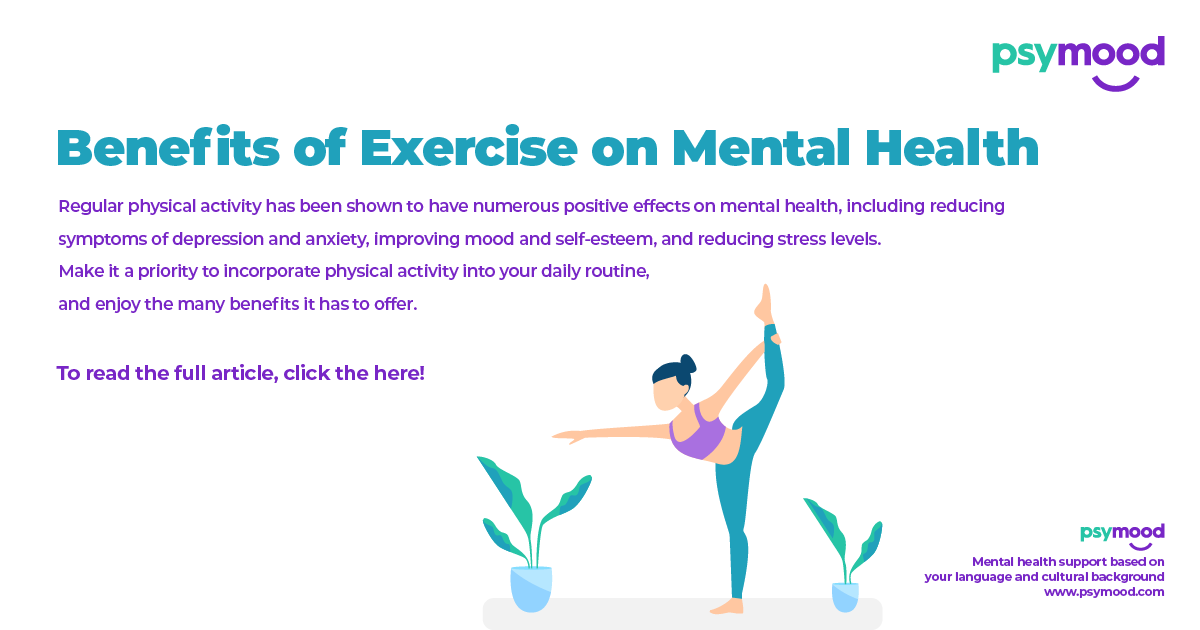Benefits of Exercise on Mental Health
The benefits of exercise are often recommended as a way to maintain physical health, but its benefits go far beyond that. Regular physical activity has been shown to have numerous positive effects on mental health, including reducing symptoms of depression and anxiety, improving mood and self-esteem, and reducing stress levels. In this blog post, we will explore the connection between exercise and mental health and the many benefits of incorporating physical activity into your daily routine.
Reducing Symptoms of Depression and Anxiety
One of the most well-established benefits of exercise on mental health is its ability to reduce symptoms of depression and anxiety. Research has shown that regular exercise can be just as effective as medication or psychotherapy for treating mild to moderate depression and anxiety disorders. Exercise helps to release feel-good chemicals in the brain such as endorphins, which can help to improve mood and reduce feelings of anxiety.
Improving Mood and Self-Esteem
Exercise has also been shown to have a positive impact on mood and self-esteem. When we exercise, our bodies release endorphins, which can produce feelings of happiness and euphoria. This can help to improve mood and reduce feelings of stress and anxiety. Regular exercise can help to improve self-esteem by increasing feelings of self-worth and confidence.
Exercise can also help people with ADHD and ADD with mood and energy regulation. I personally try to work out for an hour or two a day to help with excess energy. This makes me feel good and more productive as well.
Reducing Stress Levels
Another benefit of exercise on mental health is its ability to reduce stress levels. Exercise can help to reduce the levels of stress hormones such as cortisol in the body, which can lead to a reduction in feelings of stress and anxiety. Additionally, regular exercise can help to improve sleep quality, which can also have a positive impact on mental health.
Improving Cognitive Function
Exercise has also been shown to have a positive impact on cognitive function. Regular physical activity can help to improve memory, attention, and overall cognitive function. Additionally, exercise can help to reduce the risk of cognitive decline and dementia later in life.
Tips for Incorporating Exercise into Your Daily Routine
If you are looking to incorporate exercise into your daily routine, there are a few tips that can help you get started:
- Start small: If you are new to exercise, start with small amounts of physical activity and gradually increase the duration and intensity over time. You can start with a short walk or jog around the neighbourhood, and work your way up to a longer workout.
- Find an activity you enjoy: Exercise doesn’t have to be boring or tedious. Many people dread working out because it can be tedious, but it does not have to be this way! Find an activity you enjoy, such as dancing, swimming, or hiking, and make it a regular part of your routine.
- Make it a habit: Schedule exercise into your daily routine, and make it a non-negotiable part of your day. If you have a busy schedule then find ways to incorporate it into your time off. If you don’t have time to devote an hour to the gym, try finding ways to have short bursts of exercise throughout the day. You can do jumping jacks or squats as you are making breakfast or walk to work a few days a week.
- Get support: Exercise with a friend or join a fitness class to help you stay motivated and accountable. Exercising with a friend is a good way to get started. If you feel a little anxious about working out, doing it with a friend makes it a lot easier and very fun. Friends can also help motivate you to stay on track.
Regular exercise is a powerful tool for improving mental health. By reducing symptoms of depression and anxiety, improving mood and self-esteem, reducing stress levels, and improving cognitive function, exercise can have a positive impact on overall well-being. So, make it a priority to incorporate physical activity into your daily routine, and enjoy the many benefits it has to offer.
PsyMood is a digital tool designed to help you find the support you need in the language that you are most comfortable with. PsyMood considers cultural background, geographical location, interests, and personal needs, amongst other factors, to pair you with service providers for either online or in-person therapy sessions.


.png)
.png)
.png)
Recent Comments